
Skinks are lizards belonging to the family Scincidae, a family in the infraorder Scincomorpha. With more than 1,500 described species across 100 different taxonomic genera, the family Scincidae is one of the most diverse families of lizards. Skinks are characterized by their smaller legs in comparison to typical lizards and are found in different habitats except arctic and subarctic regions.

Amphiglossus is a genus of skinks, lizards in the family Scincidae.

Acritoscincus is a genus of Australian skinks. It belongs to the Eugongylus group; the genus Oligosoma appears to be a fairly close relative. An alternative name is Bassiana.

Carlia is a genus of skinks, commonly known as four-fingered skinks or rainbow skinks, in the subfamily Eugongylinae. Before being placed in this new subfamily, Carlia was recovered in a clade with the genera Niveoscincus, Lampropholis, and others of the Eugongylus group within Lygosominae.

Eugongylus is a genus of skinks in the subfamily Eugongylinae. It was previously recognised as namesake of the Eugonglyus group of genera within Lygosominae, where it occupied a quite basal position. Members of this genus are commonly called mastiff skinks or short-legged giant skinks.
Feylinia is a genus of skinks. It is usually placed in the monotypic subfamily Feylininae.

Lampropholis is a genus of skinks, commonly known as sunskinks, in the lizard subfamily Eugongylinae of the family Scincidae. The genus Lampropholis was previously found to belong to a clade with the genera Niveoscincus, Leiolopisma and others of the Eugongylus group within Lygosominae. All species of Lampropholis are endemic to Australia. For similar skinks see genera Bassiana, Pseudemoia, and Niveoscincus.
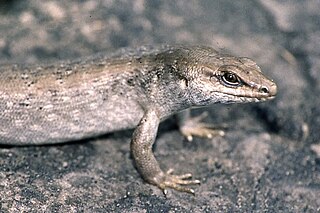
Leiolopisma is a genus of skinks. Most species occur in the region of New Caledonia-New Zealand, and they are related to other genera from that general area, such as Emoia; these and others form the Eugongylus group. One living and two extinct taxa represent a clade endemic to the Mascarenes.(Austin & Arnold 2006)
Lobulia is a genus of skinks in the subfamily Eugongylinae. The genus Lobulia is endemic to New Guinea.

Carinascincus is a genus of skinks, commonly called snow skinks or cool-skinks and residing mainly in Tasmania or Victoria, Australia. Then recognised as the genus Niveoscincus, it was found to belong to a clade with the genera Carlia, Lampropholis and others of the Eugongylus group within Lygosominae. Cogger has rejected the use of the junior name Niveoscincus and recognizes the valid senior generic name Carinascincus for the group. For similar skinks see genera Pseudemoia, Lampropholis, and Bassiana. These skinks have adapted to the cooler weather of southern Australia and particularly Tasmania, hence the common names.
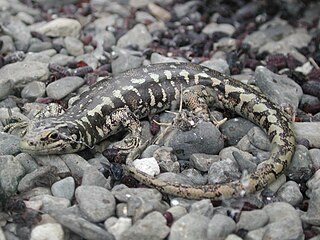
Oligosoma is a genus of small to medium-sized skinks found only in New Zealand, Norfolk Island and Lord Howe Island. Oligosoma had previously been found to belong to the Eugongylus group of genera in the subfamily Lygosominae; the Australian genus Bassiana appears to be fairly closely related.
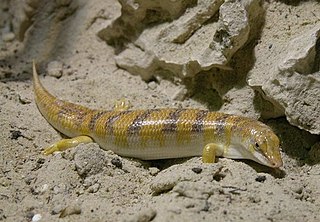
Scincus is a genus of skinks, lizards in the family Scincidae. The genus contains four or five species, all of which are typical desert inhabitants, living in sandy and dune-like areas with a hot and dry climate. Species in the genus Scincus can be found from Arabia to the Sahara desert.

Blue-tongued skinks comprise the Australasian genus Tiliqua, which contains some of the largest members of the skink family (Scincidae). They are commonly called blue-tongued lizards or simply blue-tongues or blueys in Australia or panana in Indonesia. As suggested by these common names, a prominent characteristic of the genus is a large blue tongue that can be bared as bluff-warning to potential enemies. Their tongue can also deform itself and produce a thick mucus in order to catch prey. They are relatively shy in comparison with other lizards, and also significantly slower due to their shorter legs.
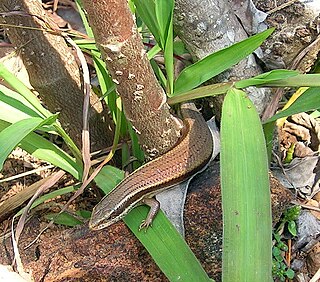
Lygosominae is the largest subfamily of skinks in the family Scincidae. The subfamily can be divided into a number of genus groups. If the rarely used taxonomic rank of infrafamily is employed, the genus groups would be designated as such, but such a move would require a formal description according to the ICZN standards.
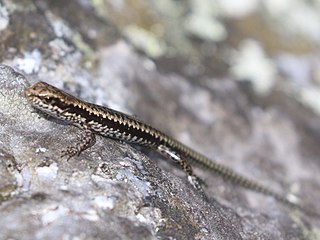
Concinnia is a genus of skinks in the subfamily Lygosominae.

Egerniinae is the subfamily of social skinks within the family Scincidae. The genera in this subfamily were previously found to belong the Egernia group in the large subfamily Lygosominae.

Mabuyinae is a subfamily of lizards, commonly known as skinks, within the family Scincidae. The genera in this subfamily were previously found to belong the Mabuya group in the large subfamily Lygosominae.

Sphenomorphinae is a large subfamily of skinks, lizards within the family Scincidae. The genera in this subfamily were previously found to belong to the Sphenomorphus group in the large subfamily Lygosominae.
Emoia klossi, also known commonly as Kloss's emo skink, Kloss' emo skink, and Kloss' skink, is a species of lizard in the subfamily Eugongylinae of the family Scincidae. The species is native to Indonesia and Papua New Guinea.

Phoboscincus garnieri, also known commonly as Garnier's giant skink and Garnier's skink, is a species of lizard in the family Scincidae. The species is endemic to New Caledonia.

















